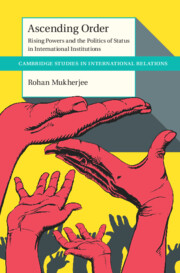Book contents
- Reviews
- Ascending Order
- Cambridge Studies in International Relations: 160
- Ascending Order
- Copyright page
- Dedication
- Epigraph
- Contents
- Figures
- Tables
- Acknowledgments
- Abbreviations
- 1 Introduction
- 2 Conceptual Foundations
- 3 Institutional Status Theory
- 4 The United States and the Atlantic System in the Nineteenth Century
- 5 Japan and the Washington System in the Interwar Period
- 6 India and the International Order of the Cold War
- 7 China and the Liberal International Order
- 8 Conclusion
- Appendix Case Selection
- Index
- Cambridge Studies in International Relations
1 - Introduction
Published online by Cambridge University Press: 21 July 2022
- Reviews
- Ascending Order
- Cambridge Studies in International Relations: 160
- Ascending Order
- Copyright page
- Dedication
- Epigraph
- Contents
- Figures
- Tables
- Acknowledgments
- Abbreviations
- 1 Introduction
- 2 Conceptual Foundations
- 3 Institutional Status Theory
- 4 The United States and the Atlantic System in the Nineteenth Century
- 5 Japan and the Washington System in the Interwar Period
- 6 India and the International Order of the Cold War
- 7 China and the Liberal International Order
- 8 Conclusion
- Appendix Case Selection
- Index
- Cambridge Studies in International Relations
Summary
In August 1993, as the shadow of the Cold War began its slow retreat, the United Nations (UN) Conference on Disarmament decided the time was ripe to negotiate a treaty banning nuclear tests once and for all. The end of superpower competition had led three of the five official nuclear powers – the United States (US), Russia, and Britain – to announce testing moratoriums, and nonnuclear states were eager for a universal ban.1 The biggest potential spoiler was China. A “vocal outsider to the global nuclear order”2 and a “latecomer to the nuclear club,”3 China had historically viewed test ban efforts as “ploys intended to monopolize nuclear weapons and solidify the larger nuclear powers’ advantages.”4
Keywords
Information
- Type
- Chapter
- Information
- Ascending OrderRising Powers and the Politics of Status in International Institutions, pp. 1 - 27Publisher: Cambridge University PressPrint publication year: 2022
